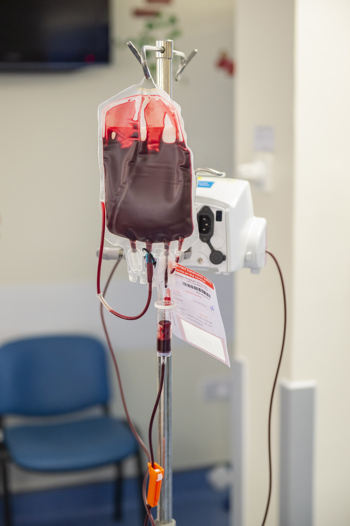Blood supply shortage alert to hospitals in England ends
Monday, 14 November 2022

Thanks to an amazing reaction from donors, good collaboration with hospitals and getting more staff to the frontline, NHS Blood and Transplant has confirmed the Amber Alert, which saw hospitals needing to restrict the amount of blood they used, is being lifted today.
The alert, which came into force on 12 October, meant hospitals were asked to put in place management plans to protect blood stocks and ensure blood is prioritised for patients who need it most. This was necessary because national blood stocks in England dropped below two days.
Blood stocks have now reached the target of six days. This has been possible thanks to the response from hospitals which has seen orders drop by 20 per cent. To help protect the stocks, hospitals are being asked to slowly restock back to their ideal stockholding levels. They are also being asked to continue best practice in patient care by use of alternatives to transfusion such as iron therapy.
Extra staff have been moved to the front line meaning the number of appointments to donate blood have increased by an average of around 3,500 per week during the course of the Amber Alert compared to the weeks running up to it.
The amazing response from donors has seen appointments being filled to an average of 99 per cent each week during the course of the alert compared to 94 per cent pre alert, meaning an average of 5,200 extra booked appointments each week.
The biggest challenge continues to be permanently recruiting front line staff. NHSBT has launched a new recruitment campaign to bring in staff as quickly as possible. Since 1 July, 163 donor carers and donor carer supervisors have started, a further 95 have been recruited and are due to start imminently, and an additional 118 posts are being recruited to.
Wendy Clark, Chief Executive at NHS Blood and Transplant said:
“The Amber Alert was a vital measure to protect patients who need blood the most while supplies were low. We have worked hard to quickly recover and secure blood stocks and I’m very grateful to our staff, donors and hospitals who have helped to ensure we can lift the alert as soon as possible.
“We are asking hospitals to restock slowly and to order the right amount of blood they need for patients so we can make best use of our donors’ precious blood.
“We need to continue to fill appointments so we can supply the blood every patient needs. We’ve seen an amazing response from our O+ and O- donors. We now also need A+ donors to come forward. If you’re a first-time donor please book an appointment at one of our donor centres in the run up to Christmas or in the New Year.
“Each blood donation can save or improve up to three lives.”
Winter is always a challenging time for blood stocks. Cold weather can lead to higher rates of seasonal illnesses and extreme weather like snow or flooding can also affect travel and venue availability. This can lead to a rise in short notice cancellations by donors and due to staff shortages on the day, which can make it more challenging to collect enough blood.
To grow and diversify the donor base 150,000 new blood donors are needed every year.
Donors are being asked to continue to book appointments in the run up to Christmas and into the new year to help build stocks over winter. There is capacity in the weeks ahead – appointments need to be close to 100 per cent full to build blood stocks:
- Week commencing 14 November – appointments are 86% full
- Week commencing 21 November – appointments are 80% full
- Week commencing 28 November – appointments are 76% full
- Week commencing 5 December – appointments are 66% full
- Week commencing 12 December – appointments are 59% full
- Week commencing 19 December – appointments are 53% full
- Week commencing 26 December – appointments are 38% full
- Week commencing 2 January – appointments are 59% full
- Week commencing 9 January – appointments are 57% full
- Week commencing 16 January – appointments are 50% full
Find the best availability and make an appointment on blood.co.uk, via the NHSGiveBlood app or call 0300 123 23 23.